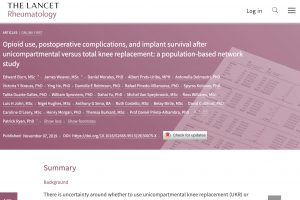 The IMI European Health Data & Evidence Network (EHDEN) project is pleased to announce the publication of the results of its first ‘study-a-thon’ in Lancet Rheumatology the effectiveness and safety associated with unicompartmental versus total knee replacement, a milestone after its first year.1
The IMI European Health Data & Evidence Network (EHDEN) project is pleased to announce the publication of the results of its first ‘study-a-thon’ in Lancet Rheumatology the effectiveness and safety associated with unicompartmental versus total knee replacement, a milestone after its first year.1
The choice of which type of knee replacement to recommend remains difficult for surgeons, and there remains insufficient information to inform them and patients of the best approach, dependent on the patient’s personal context.
Researchers associated with the Observational Health Data Sciences and Informatics (OHDSI) network and EHDEN met in Oxford for five days in December 2018 to design, analyze and draft a report of the study results. The resulting study emulated to the extent possible, the design of the five year Total or Partial Knee Arthroplasty Trial (TOPKAT). The study-a-thon assessed whether the efficacy results seen in the trial translated into effectiveness in real-world settings and provided further consideration of safety outcomes that were too uncommon to assess in TOPKAT.
Results reported in this paper by Burn, et al, were from the largest study to date assessing the relative merits of unicompartmental and total knee replacement, with data on more than 250,000 individuals who underwent either procedure in five databases from the US and the UK.
Unicompartmental knee replacement was associated with a reduced risk of complications, in particular venous thromboembolism, and persistent opioid use, possibly indicating a reduced risk of persistent pain after surgery. Total knee replacement was, however, associated with a lower risk of revision procedures, and the need to repair or replace the original replacement.

Dani Prieto-Alhambra shares the process and results of the Oxford study-a-thon on exploring knee arthroplasty. Dani will serve as host of the 2020 OHDSI European Symposium (March 27-29).
In an accompanying editorial to the paper, Sayers and Whitehouse noted, “Burn and colleagues are to be applauded for using innovative methods and adding to the evidence base, helping to better inform patients and surgeons in the shared decision making process.”2
“EHDEN will stimulate the further development of the research ecosystem that this study utilized in Europe,” commented Professor Prieto-Alhambra, one of the senior authors of the paper, and a research lead within EHDEN, continuing,“by doing so, EHDEN will increase our ability to generate reliable, reproducible and top quality evidence from real-world data in Europe and globally.”
“This is exactly what EHDEN is setting out to do in terms of good quality evidence that informs clinical practice across many domains, but importantly it also demonstrates the efficacy of our collaboration with OHDSI,” said Associate Professor Rijnbeek, Academic Coordinator of EHDEN.
A video presentation on the EHDEN project and the study-a-thon can be found below.
- Burn E, et al; Complications and adverse events of unicompartmental versus total knee replacement; Lancet Rheumatology 2019; published online November 7
- Sayers A, Whitehouse MR; Complications and adverse events of unicompartmental versus total knee replacement; Lancet Rheumatology 2019; published online November 7
(This release is courtesy of EHDEN.eu)
The European Health Data & Evidence Network (EHDEN)
A project within the Innovative Medicines Initiative (IMI) and is part of its Big Data For Better Health Outcomes (BD4BO) initiative. EHDEN is a group of twenty-two partners: eleven public organisations and eleven pharmaceutical companies. Its mission is to develop a federated network, standardised to a common data model, that more smartly shares and manages real-world data and research methodologies, and expands education in open science and collaboration, ultimately to increase the speed to evidence generation and improving outcomes for patients. To learn more about EHDEN and its vision to enable better health decisions, outcomes and care across Europe, visit our website.
The European Health Data & Evidence Network has received funding from the Innovative Medicines Initiative 2 Joint Undertaking (JU) under grant agreement No 806968. The JU receives support from the European Union’s Horizon 2020 research and innovation programme and EFPIA.
